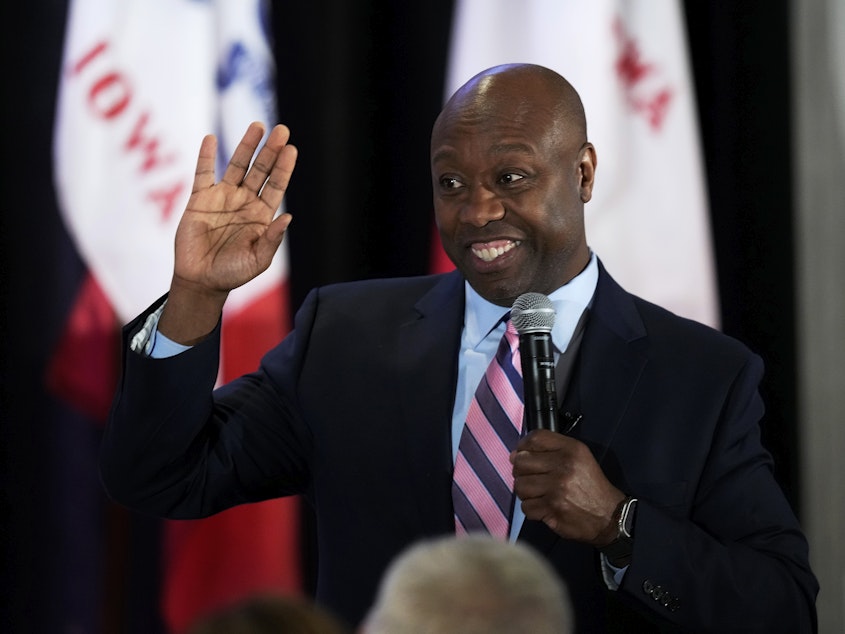South Carolina Sen. Tim Scott takes a significant step toward a presidential run

Updated April 12, 2023 at 10:41 AM ET
Republican South Carolina Sen. Tim Scott has taken a significant step toward a presidential bid, launching an exploratory committee.
An exploratory committee allows him to raise money that could then be transferred to an official presidential campaign.
Scott, the only Black Republican currently in the U.S. Senate, launched his committee Wednesday (April 12), which he noted in a video is the day marking the beginning of the Civil War at Fort Sumter in South Carolina.
His launch comes before planned travel this week to Iowa, New Hampshire and back home to South Carolina as he continues his "Faith in America" tour.
Sponsored
Scott's video is also titled "Faith in America." "I bear witness that America can do for anyone what she has done for me," he says in it.
He adds: "I will never back down in defense of the conservative values that make America exceptional."
Should he make his candidacy official — as expected — Scott, 57, would join his fellow South Carolinian Nikki Haley, a former governor of the state; as well as former President Donald Trump, former Arkansas Gov. Asa Hutchinson and others in the Republican primary field.
Like many of his GOP peers, Scott has had to balance a call for new leadership in the party while not openly attacking Trump, who isn't just the leading Republican candidate, but to many, still the face of the party.
But for Scott it's an uphill battle even in his home state. A recent Winthrop University poll — shared by Trump soon after Scott announced his exploratory committee — shows him badly trailing the former president. In the poll of South Carolina Republicans, 41% of people say they'd vote for Trump, compared with 7% for Scott.
Sponsored
In a statement, Democratic National Committee Chair Jaime Harrison linked Scott to Trump.
"Tim Scott wants to govern from the 'far, conservative right' as a proud member of the Tea Party, and his extreme record proves it," Harrison said.
Scott indicated he was preparing to run for the Oval Office last summer in the summary and advanced copies of his memoir, America, a Redemption Story: Choosing Hope, Creating Unity. But as NPR's Juana Summers reported at the time, that part of Scott's book was untrue — at least at the time — and the publishers issued an apology for the error.
Republicans tapped Scott to deliver the GOP response to President Biden's first address to Congress
Part of Biden's address in 2021 was a claim the country had "come together to rebuild trust between law enforcement and the people they serve, to root out systemic racism in our criminal justice system."
Sponsored
Scott responded to the issue head on.
"Nowhere do we need common ground more desperately than in our discussions of race. I have experienced the pain of discrimination. I know what it feels like to be pulled over for no reason, to be followed around a store while I'm shopping," he said.
Scott said Black children in schools are told that the color of their skin defines them, as it did 100 years ago, and that some students are labeled as oppressors based on how they look.
"From colleges to corporations to our culture, people are making money and gaining power by pretending we haven't made any progress at all. By doubling down on the divisions we've worked so hard to heal," Scott said. "You know this stuff is wrong. Hear me clearly: America is not a racist country. It's backwards to fight discrimination with different types of discrimination, and it's wrong to try to use our painful past to dishonestly shut down debates in the present."
Scott's political career began on the Charleston County Council, where he served for more than a decade before being elected to the South Carolina House of Representatives. He spent two years at the state level before winning a seat at the U.S. House representing South Carolina's 1st Congressional District in 2010, according to Ballotpedia.
Sponsored
He served a single term before he was appointed to fill the seat of Sen. Jim DeMint in 2013. Scott has been reelected twice, most recently in 2022, which he claimed to be his last Senate run, South Carolina Public Radio reported. [Copyright 2023 NPR]



